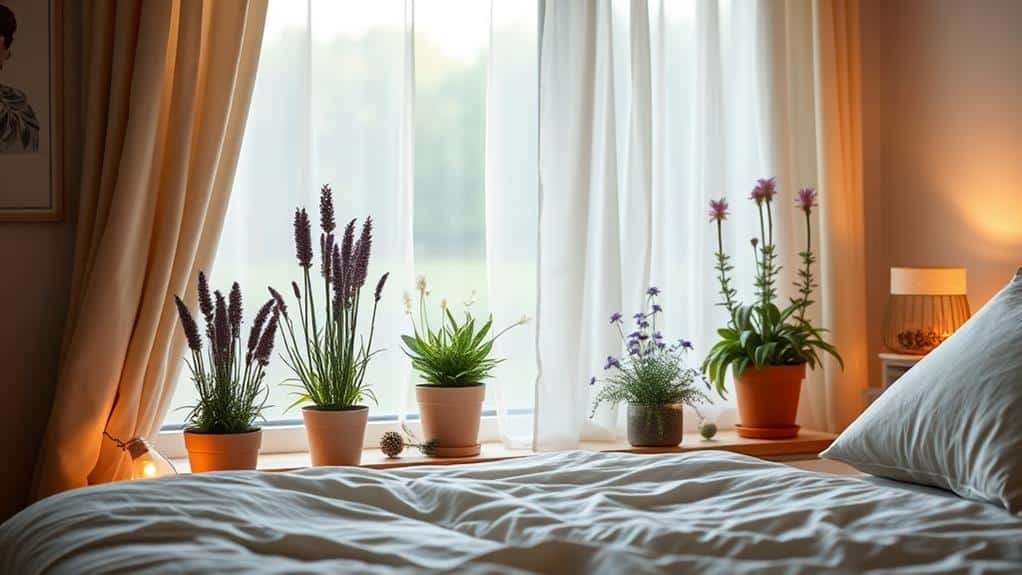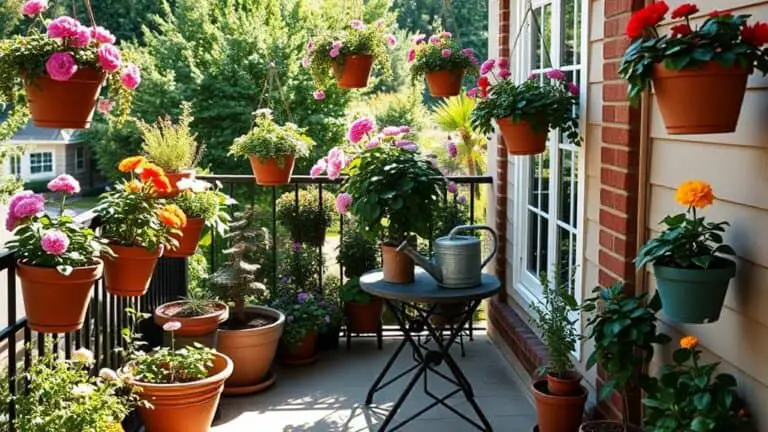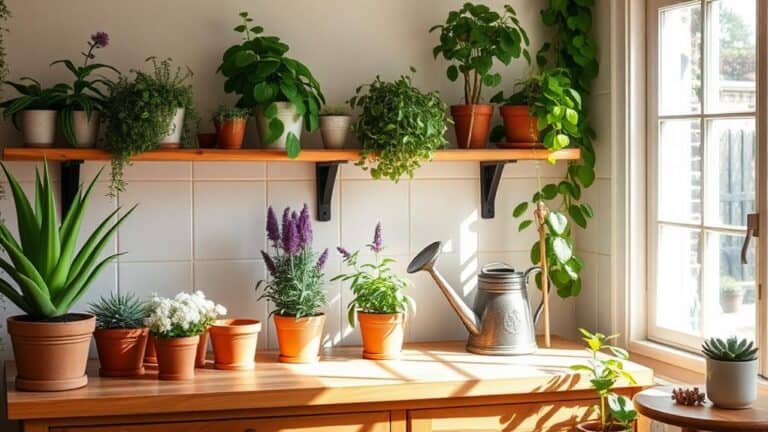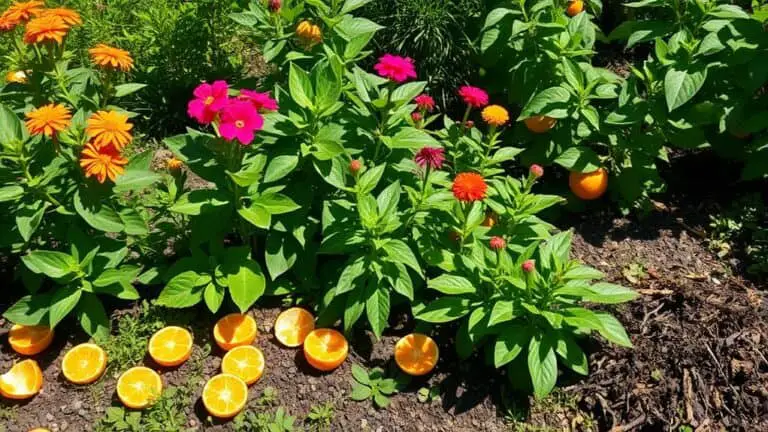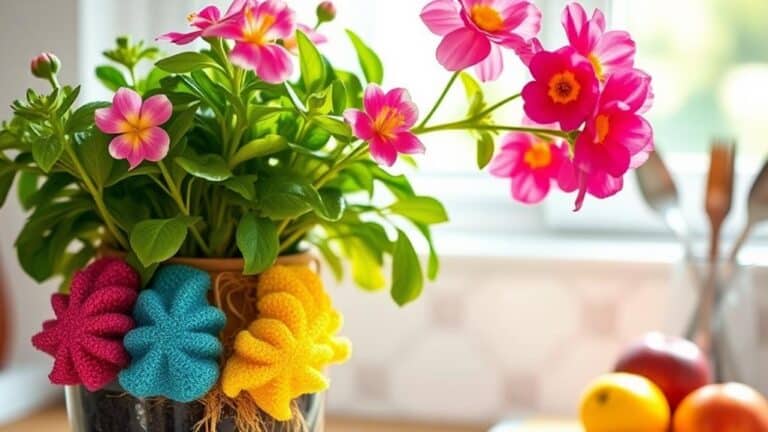Herbs You Should Grow In Your Bedroom To Improve Sleep
I've always found that having a few well-chosen herbs in the bedroom can make a significant difference in sleep quality. Valerian, chamomile, and lemon balm are particularly effective in calming the mind and reducing anxiety. Imagine winding down with the gentle scents of jasmine and peppermint wafting through the air, creating a peaceful haven. But it's not just about the aromas; these herbs also offer natural remedies for insomnia. Curious about how you can easily cultivate these sleep-enhancing plants in your own space? There's a lot more to explore.
Valerian
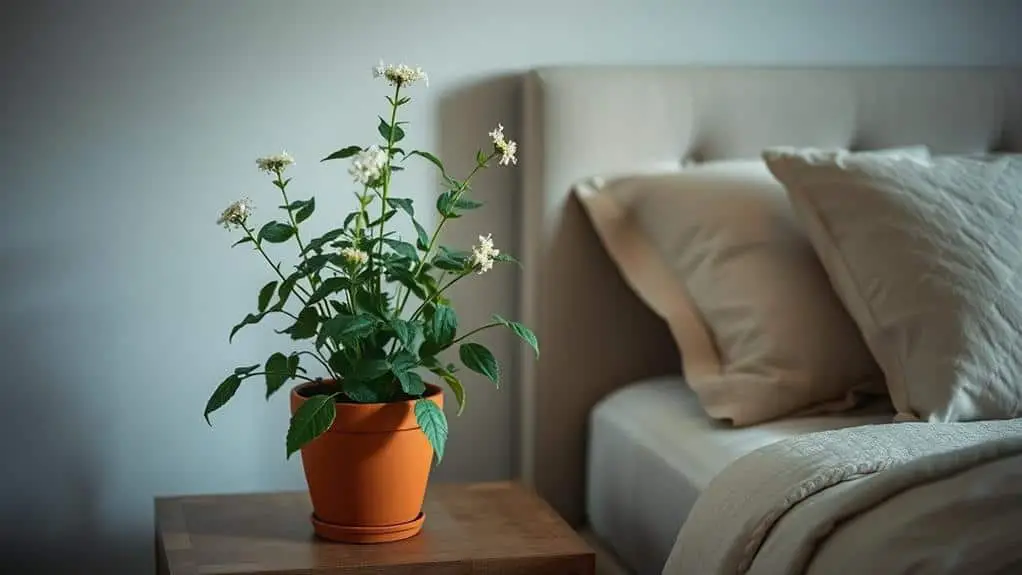
Valerian, known scientifically as Valeriana officinalis, is renowned for its calming effects and has been historically used to treat insomnia and anxiety, promoting deeper sleep quality.
This amazing herb contains valerenic acid, which can increase GABA levels in your brain, helping you relax and fall asleep faster. You can enjoy valerian as a tea or in tincture form, starting with 5-10 drops or one cup of tea before bedtime.
For growing valerian, remember it loves about six hours of sunlight daily and thrives in rich soil.
It's a great addition to your bedroom garden. However, keep an eye on how it affects you, as some people might feel a bit agitated at first.
Happy gardening and sweet dreams!
Chamomile
Chamomile is a fantastic herb to ponder if you want to improve your sleep quality. It contains a special compound called apigenin, which helps you relax and fall asleep more easily.
Plus, growing chamomile at home is simple—you can plant it in a sunny spot, indoors or out, and it doesn't need much care.
Sleep-Promoting Properties
One of nature's most effective sleep aids is a humble herb packed with sleep-promoting properties. Chamomile can be a game-changer for your sleep routine.
It contains apigenin, a flavonoid that binds to receptors in your brain, promoting relaxation and calm. Studies have shown that regular consumption of chamomile tea reduces insomnia symptoms and enhances overall sleep duration.
Chamomile also boasts anti-inflammatory and antioxidant properties, soothing your body and calming your mind before sleep.
Plus, its calming aroma can help reduce anxiety and create a peaceful atmosphere.
- Apigenin: Binds to brain receptors, promoting relaxation
- Reduces insomnia: Regular tea consumption enhances sleep
- Anti-inflammatory: Soothes the body for better rest
- Calming aroma: Reduces anxiety, creating a peaceful environment
Easy Indoor Cultivation
Growing chamomile indoors is surprisingly simple and rewarding. The key to easy indoor cultivation is to start with well-drained, nutrient-rich soil that has a neutral pH. Place your chamomile on a sunny windowsill so it gets at least 6 hours of sunlight daily. Regular watering is a must, but let the top inch of soil dry out before watering again to avoid root rot. Chamomile can be grown from seeds or bought as seedlings. It blooms in early summer with beautiful white flowers.
| Step | Requirement | Tip |
|---|---|---|
| 1 | Soil | Well-drained, nutrient-rich |
| 2 | Sunlight | At least 6 hours daily |
| 3 | Water | Water when top inch is dry |
| 4 | Seeds/Seedlings | Start with either |
| 5 | Harvesting Flowers | When fully open |
Don't forget, chamomile pairs well with lavender, offering a soothing touch to your bedroom.
Lavender
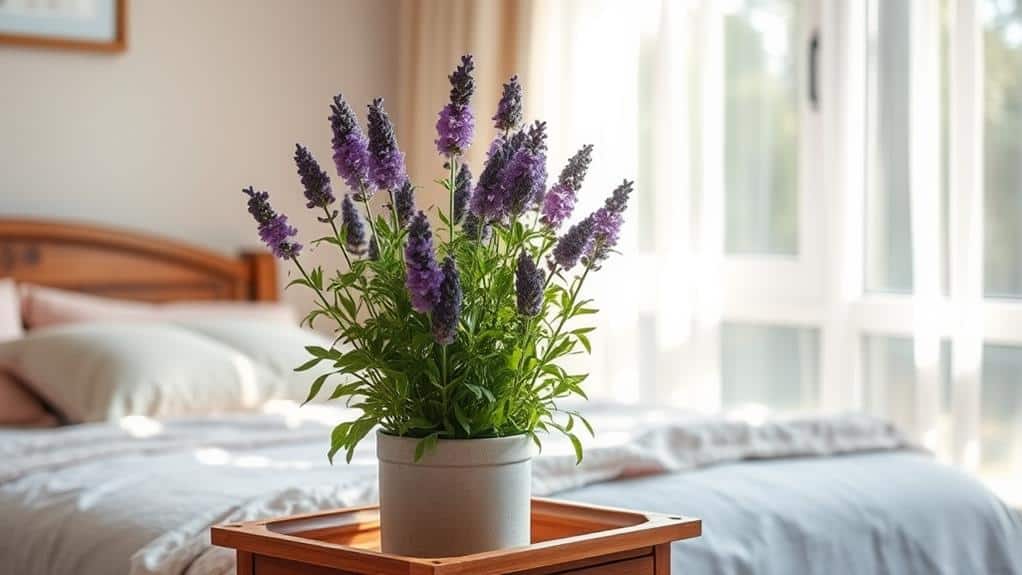
Among the various herbs known for their sleep-enhancing properties, lavender stands out due to its calming aroma that can greatly reduce cortisol levels.
If you're looking to improve sleep quality, consider adding a lavender plant to your bedroom. The scent of lavender has been shown to help you get better sleep by lowering your heart rate and blood pressure.
To make the most of this wonderful herb, remember:
- Grow the lavender plant in well-drained soil.
- Water it regularly when the top inch of soil feels dry.
- Enjoy the beautiful purple flowers that add a soothing touch.
- Use lavender sachets or essential oils for added relaxation.
With these tips, you can create a calming environment and enjoy more restful nights.
Passionflower
For a natural way to enhance your sleep, consider passionflower. This wonderful herb, known for its calming properties, can notably improve sleep quality.
Passionflower helps alleviate anxiety and promotes relaxation, making it easier to fall asleep. You can grow this plant indoors, ensuring it gets plenty of sunlight and regular watering. Having it in your bedroom not only beautifies the space but also offers a practical solution to sleep troubles.
Research shows that passionflower increases levels of gamma-aminobutyric acid (GABA) in the brain, which enhances sleep quality. It's generally safe for most people, but avoid mixing it with other sedatives without consulting your doctor.
Passionflower is a natural alternative to over-the-counter sleep aids, helping reduce insomnia symptoms.
Lemon Balm
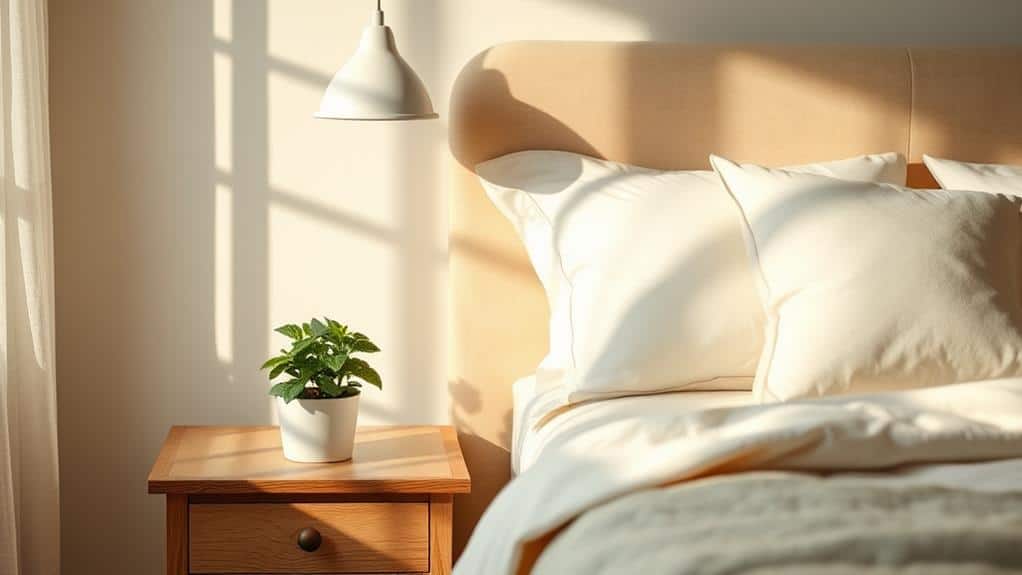
Lemon balm is a fantastic herb that can naturally reduce anxiety and improve your sleep quality.
It's easy to grow indoors in pots, needing just moderate sunlight and regular watering.
Reduces Anxiety Naturally
Ever wondered how to naturally reduce anxiety and improve your sleep? Growing lemon balm in your bedroom might be the answer. This herb, known for its calming properties, can help reduce anxiety and make you feel more relaxed.
Imagine how peaceful your nights could be with a bit of lemon balm in your room.
Here are some reasons why you should consider growing lemon balm:
- Calming properties: Lemon balm helps soothe your mind, making it easier to unwind.
- Easy to grow: It thrives in well-drained soil and needs only moderate sunlight.
- Multiple uses: You can make tea or tinctures to enjoy its benefits.
- Improves sleep quality: Regular intake can reduce anxiety-related symptoms.
Give it a try, and you might notice a significant improvement in your overall well-being.
Improves Sleep Quality
Quality sleep is a cornerstone of good health, and lemon balm (Melissa officinalis) can play a pivotal role in achieving it. Known for its calming properties, lemon balm helps create an atmosphere of sleep and relaxation.
Drinking lemon balm tea or using it as a supplement can improve overall sleep quality and reduce insomnia symptoms. I've found that its soothing lemon scent not only relaxes my mind but also sets a calming tone in my bedroom.
Studies suggest that combining lemon balm with other herbs like chamomile enhances its effects. By reducing stress and lifting my mood, lemon balm guarantees I wake up refreshed. This herb truly makes a difference in my nightly rest.
Easy Indoor Growth
Starting with a versatile herb like lemon balm can make indoor gardening both enjoyable and rewarding. This hardy herb thrives indoors and is perfect for those seeking easy indoor growth.
Place it in bright, indirect sunlight and watch it flourish. Lemon balm's calming properties can help improve your sleep quality, making it a great addition to your bedroom.
Here's what you need to know:
- Prefers well-draining soil
- Needs watering when the top inch feels dry
- Can be harvested regularly to encourage growth
- Adds a soothing touch to teas, salads, and desserts
Growing lemon balm not only enhances your decor with lush greenery but also creates a soothing environment.
This simple herb can make a big difference in your sleep routine.
Holy Basil
Holy Basil, often called Tulsi, stands out for its incredible adaptogenic properties that help reduce stress and promote relaxation, making it a powerful ally for better sleep. This herb thrives in warm conditions and needs moderate sunlight, so it's perfect for a bedroom with enough light. Holy Basil can help regulate cortisol levels, easing anxiety and insomnia. Plus, it's easy to care for and only needs minimal watering, ideal for beginners. You can brew the leaves into a soothing tea or use them in recipes.
Here's a quick overview:
| Benefit | Details | Emotional Impact |
|---|---|---|
| Stress Reduction | Adaptogenic properties | Calm and Relaxed |
| Easy to Grow | Thrives indoors | Confident and Happy |
| Cortisol Control | Manages anxiety and stress | Peaceful and Restful |
| Versatile Usage | Tea and culinary use | Supported and Healthy |
Growing Holy Basil in your bedroom can truly transform your sleep environment.
Jasmine
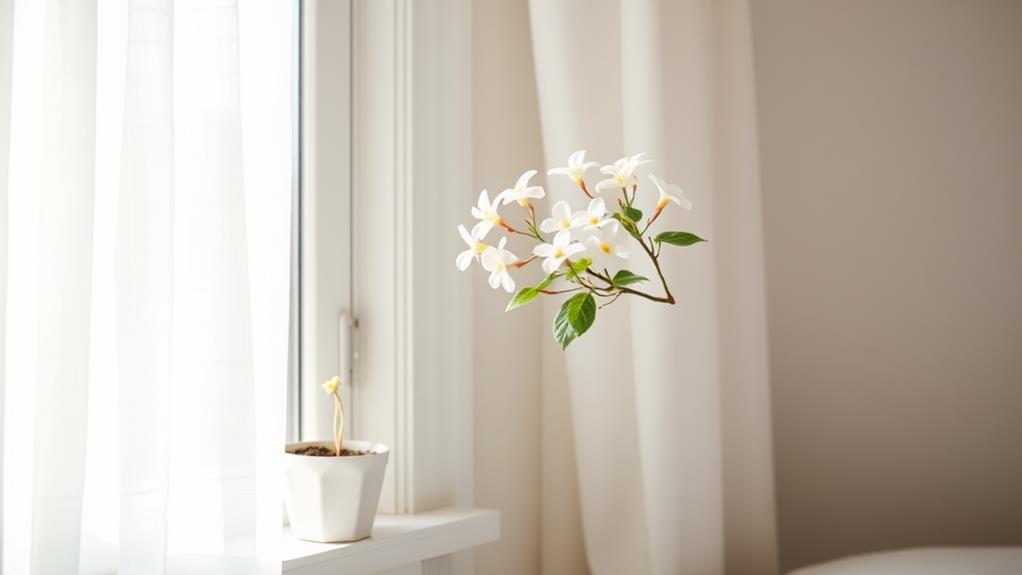
While Holy Basil works wonders in reducing stress and promoting relaxation, Jasmine offers a unique approach to enhancing sleep quality. Its small, fragrant white flowers emit a sweet scent that can greatly improve sleep and reduce anxiety.
Placing jasmine in your bedroom helps create a soothing atmosphere, making it easier to unwind.
To successfully grow jasmine, keep these tips in mind:
- Bright, indirect sunlight: Place it near a window for ideal growth.
- Regular watering: Make sure the soil remains hydrated, especially during flowering periods.
- Pot-friendly: Jasmine thrives in pots, making it perfect for indoor spaces.
- Aesthetic appeal: Its beautiful blooms add charm to any room.
Incorporating jasmine into your bedroom can transform your sleep environment into a peaceful haven.
Peppermint
Peppermint, known scientifically as Mentha piperita, offers much more than just a revitalizing scent. Its soothing scent helps reduce stress and promote relaxation, perfect for a peaceful sleep environment. The menthol in peppermint can calm muscles and relieve tension, aiding sleep quality. Growing peppermint in your bedroom gives you easy access to its leaves for a calming tea before bed. This herb thrives in bright, indirect light and needs regular watering, making it low-maintenance.
Here's a quick table to help:
| Feature | Benefit | Care Requirements |
|---|---|---|
| Soothing scent | Reduces stress | Bright, indirect light |
| Menthol | Relieves muscle tension | Regular watering |
| Leaves | Can be brewed into calming tea | Low-maintenance |
| Aromatic | Alleviates headaches | |
| Easy to grow | Enhances sleep environment |
Give peppermint a try for a more restful sleep!
Catnip
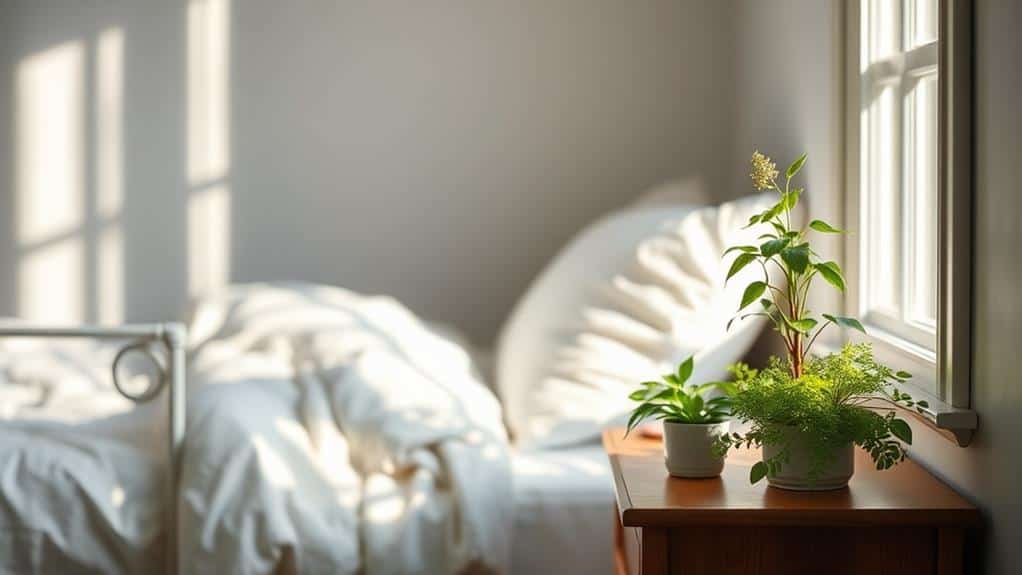
Catnip is an amazing herb that can help you sleep better by reducing anxiety and promoting relaxation.
It's really easy to grow indoors, needing just well-drained soil and plenty of sunlight.
You can enjoy its calming effects by making a soothing herbal tea or using it in sachets to help you fall asleep faster and stay asleep longer.
Sleep-Inducing Properties
Among the many herbs known for their sleep-enhancing properties, catnip stands out for its unique ability to induce relaxation and improve sleep quality.
Catnip contains nepetalactone, a compound that acts as a mild sedative, helping to soothe the nervous system.
Benefits of catnip include:
- Reduces Anxiety: Catnip can help calm your mind, reducing stress-related sleep disturbances.
- Promotes Calmness: The herb's sleep-inducing properties make it easier to wind down at night.
- Safe to Use: Most people can safely consume catnip, making it a reliable option for enhanced sleep.
- Tea Before Bed: Drinking catnip tea before bedtime can further enhance relaxation and prepare your body for restful sleep.
Easy Indoor Growth
Growing catnip indoors is a straightforward task that doesn't require a green thumb. Catnip is known for its easy indoor growth, thriving with just bright, indirect light and regular watering when the soil feels dry.
This herb not only promotes better sleep but also adds beauty to your bedroom with its small, fragrant flowers. Catnip can grow up to 3 feet tall, making it a lovely addition to your indoor garden.
One of the best parts? Catnip acts as a natural pest repellent, helping to keep unwanted insects away.
The herb's calming properties can be enjoyed as a tea, which may help you relax at night. With minimal care, catnip can enhance your sleep environment effortlessly.
Stress and Anxiety Relief
Imagine a serene, sleep-enhancing herb right in your bedroom that gently eases your mind at the end of a long day. Catnip, scientifically known as Nepeta cataria, works wonders for stress and anxiety relief. Its calming compounds, like nepetalactone, help soothe the nervous system and create a peaceful environment, perfect for sleep.
By growing catnip in your bedroom, you can enjoy its soothing aroma, which may lower cortisol levels and improve sleep quality. You can also make catnip tea to further ease anxiety before bedtime.
Here are some benefits of having catnip:
- Reduces anxiety and promotes relaxation
- Induces a mild sedative effect
- Lowers cortisol levels
- Improves overall sleep quality
Give catnip a try for a stress-free, restful night!
Rosemary
Rosemary, an aromatic herb, isn't just for your kitchen—it's also a fantastic addition to your bedroom for enhancing sleep quality. Its pleasant scent can help reduce stress and promote relaxation, making it easier for you to drift off.
Plus, rosemary has antimicrobial properties that act as an air purifier, creating a healthier sleep environment. It's quite easy to grow indoors too. Just place it in bright, indirect light and use well-draining soil.
Water it when the top inch of soil feels dry to keep it thriving. Not only will this herb help you sleep better, but it also boosts cognitive function, making your bedroom a calmer and more productive space.
Give rosemary a try—you'll love the benefits!
Frequently Asked Questions
What Plant Is Good for Sleep in Bedroom?
I recommend lavender for its benefits. Its calming aroma improves your sleep environment. Drinking chamomile tea before bed and using valerian root can also help. These plants enhance relaxation and make your sleep environment more soothing.
What Is the Most Powerful Herb for Sleep?
I believe Valerian Root is the most powerful herb for sleep. It's a staple in herbal remedies, enhancing sleep quality with its calming scents. Including it in nighttime rituals can greatly improve your ability to fall asleep.
Is It Good to Sleep With Plants in Your Bedroom?
I believe it's great to sleep with plants in your bedroom. They improve bedroom air and sleep quality while creating a calming atmosphere. Just guarantee proper plant care so they thrive and choose non-toxic options if you have pets.
What Is the Best Plant to Help You Sleep?
The best plant to help you sleep? I'd say it's a toss-up between lavender, with its calming benefits, and the peace lily, which purifies air. Chamomile and valerian root also offer great calming effects but aren't typically grown indoors.
Conclusion
Growing herbs like valerian, chamomile, and lemon balm in your bedroom can really boost your sleep quality. These plants not only help you relax but also make your space look and feel peaceful. Don't worry if you're new to gardening; these herbs are pretty easy to care for. Plus, the benefits are totally worth it. So, give it a try and enjoy a more restful night's sleep. You've got this! Happy gardening!

